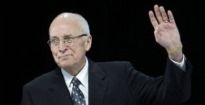Cheney Gets Heart Pump
A few days before Christmas, former Vice President Dick Cheney ended a self-imposed sabbatical from partisan politics to headline a fund-raiser for Maria Cino, a party operative and Bush administration official who is running to replace Michael Steele as head of the Republican National Committee.
The fund-raiser for Ms. Cino, held at the Alexandria, Va., home of Mr. Cheney’s former aide Mary Matalin, was his first major foray into partisan Washington political theater since receiving a mechanical heart pump in July that has, most doctors say, saved Mr. Cheney’s life by taking on the task of helping to push blood through his arteries.
Mr. Cheney, as he did at several holiday receptions in Washington, chatted about his new pump. At one cocktail party, he even opened his coat jacket to show it off. While Mr. Cheney is noticeably thinner — his trademark stiff, one-sided grin now shows up on a markedly leaner face — he is returning, associates say, to his old life, including hunting and socializing.
But for the most part, Mr. Cheney, 69, has put aside his public role as the fiery, combative political figure of the last two years, who seemed to relish every opportunity to engage in verbal jousting with President Obama.
With George W. Bush having decided to stay largely silent during Mr. Obama’s tenure, Mr. Cheney embraced the role of public critic, accusing the new, young president of rolling back Bush-era policies and undermining the nation’s security. In 2009, Mr. Cheney and Mr. Obama gave dueling speeches on the same day.
Now, however, family members and friends paint a portrait of a man less focused on the day-to-day back-and-forth in Washington and one more interested in documenting his years of service in a memoir and navigating life with his new pump.
Mr. Cheney’s heart will never beat at full strength again, doctors say. His new mechanical pump, a partial artificial heart known as a ventricular assist device, leaves patients without a pulse because it pushes blood continuously instead of mimicking the heart’s own beat. Most pulse-less patients feel nothing unusual, but the devices do pose significant risks of infection. They are implanted as a last resort either for permanent use or as a bridge to transplant until a donor heart can be found. Mr. Cheney, who has participated in some of the nation’s toughest decisions for decades, now faces a crucial one of his own: whether to seek a full heart transplant. ...


